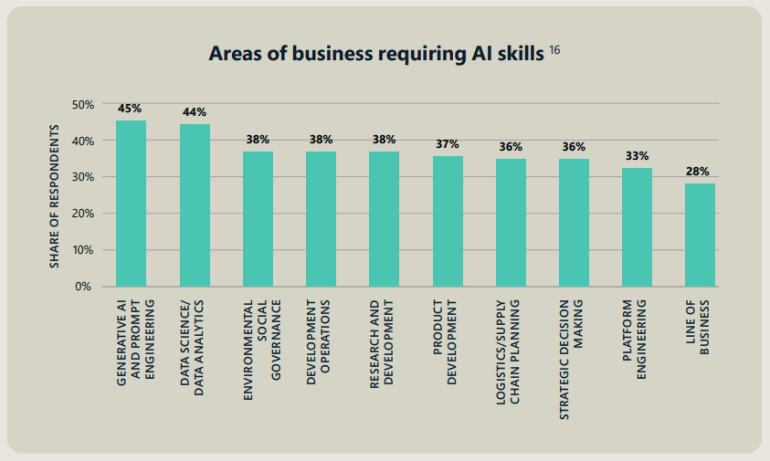- Microsoft introduces a four-phase AI education initiative for businesses.
- Phases include Understanding AI, Preparing for AI, Using AI, and Building AI Solutions.
- Initiative aims to equip organizations with skills for AI integration and innovation.
- Focus on ethical AI development and comprehensive skill-building across teams.
- Emphasizes practical application through tools like Microsoft Copilot and Azure Machine Learning.
Main AI News:
Microsoft has introduced a comprehensive AI education initiative tailored to meet the diverse needs of various roles within businesses, spanning from executives to citizen developers. This initiative is organized into four distinct phases: Understanding AI, Preparing for AI, Utilizing AI, and Developing AI Solutions. Each phase equips organizations with the requisite skills to seamlessly integrate AI into their operations, thereby enhancing productivity, fostering innovation, and driving overall business transformation.
- Understanding AI
The initial phase of Microsoft’s AI education journey focuses on establishing a foundational understanding of AI across the organization. This phase is crucial for aligning team members on essential AI concepts, definitions, and terminology, facilitating cohesive comprehension and enabling strategic planning. By demystifying AI, businesses can establish a unified knowledge framework empowering every team member to contribute effectively to AI initiatives.
Microsoft underscores the significance of ethical AI in this foundational phase, ensuring that developed AI systems uphold principles of ethics, inclusivity, reliability, and security. This approach underscores Microsoft’s commitment to leading the industry in developing safe and responsible AI technologies.
- Preparing for AI
The second phase, Preparing for AI, emphasizes the acquisition of specific skills necessary for successfully constructing and deploying AI solutions. This phase is pivotal for establishing the infrastructure that supports AI applications. For example, organizations implementing Microsoft 365 Copilot must manage their tenant and prepare data to facilitate effective AI-driven searches. Simultaneously, those utilizing Copilot for Security must comprehend tools like Microsoft Defender and Microsoft Sentinel for threat management.
Preparing for AI also entails upskilling technical teams in areas such as data engineering, data science, and analytics. Microsoft offers resources to educate teams on managing and safeguarding data to ensure readiness for AI applications. This phase lays the groundwork for successful AI deployment by equipping teams with essential technical knowledge.
- Utilizing AI
The third phase, Utilizing AI, delves into integrating AI across all facets of organizational functions. This phase aims to enhance productivity and foster innovation through tools such as Microsoft Copilot, enabling users across diverse roles to leverage AI for enhanced efficiency and creativity.
The potential of AI to reshape work culture is profound, particularly for business users. Ensuring teams possess the knowledge and skills to effectively utilize AI can drive cultural transformation within the organization. Microsoft focuses on training end-users to maximize the benefits of AI tools, emphasizing the importance of effective prompt engineering to optimize AI application usage.
- Developing AI Solutions
The final phase, Developing AI Solutions, encourages the creation of AI-driven experiences within applications and services, leveraging Microsoft’s extensive ecosystem. This phase is essential for organizations seeking to enhance business transformation through the development and expansion of AI capabilities. Microsoft equips businesses with the tools and flexibility required to develop customized AI solutions, whether through the creation of machine learning models using Azure Machine Learning or the development of intelligent chatbots using Microsoft Copilot Studio.
Businesses can unlock new avenues for driving productivity and fostering growth by training teams in AI solution development. Microsoft’s approach ensures that the potential to leverage AI is limited only by the imagination and skills of the involved teams.
Enhancing Skills Across Every Business Domain
A pivotal aspect of Microsoft’s AI education initiative is its focus on enhancing skills across every business domain. Acknowledging AI’s impact across all facets of an organization, Microsoft advocates for a comprehensive approach to AI skill development. This involves training everyone from leadership and IT personnel to developers and business users. By ensuring foundational AI knowledge across the organization, companies can achieve broad AI adoption and alignment, thereby driving organizational success.
Commence Learning with a Trusted Collaborator
Microsoft positions itself as a trusted collaborator in AI skill development, offering a wealth of curated resources, tools, and guidance through Microsoft Learn. This platform supports businesses at every stage of their AI journey, providing role-specific and technology-driven training to build upon existing skills. Through Microsoft Learn, organizations can obtain validated AI competencies via Microsoft Credentials, including certifications and practical skills tailored to AI job roles and projects. This structured approach to AI education prepares teams to execute innovative AI projects and achieve strategic business objectives.
Conclusion:
This initiative by Microsoft marks a strategic effort to empower businesses across sectors with essential AI capabilities. By addressing both foundational knowledge and practical application through structured learning phases, Microsoft not only supports current AI integration needs but also prepares businesses for future advancements. This comprehensive approach is poised to influence the market by fostering a culture of AI-driven innovation and ensuring organizations can effectively leverage AI technologies to drive productivity and competitive advantage.

